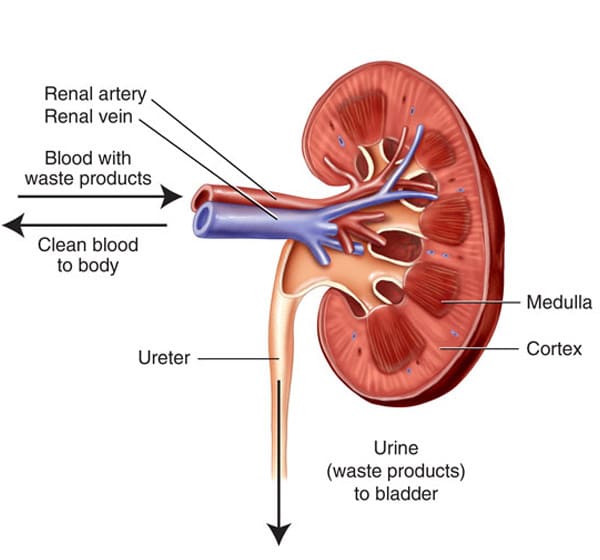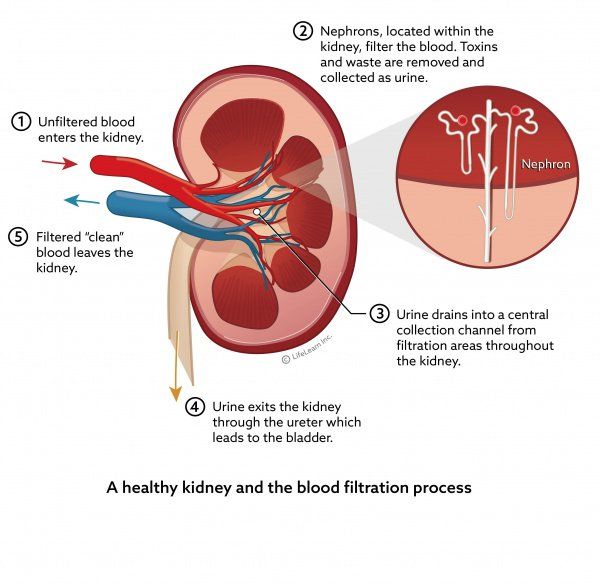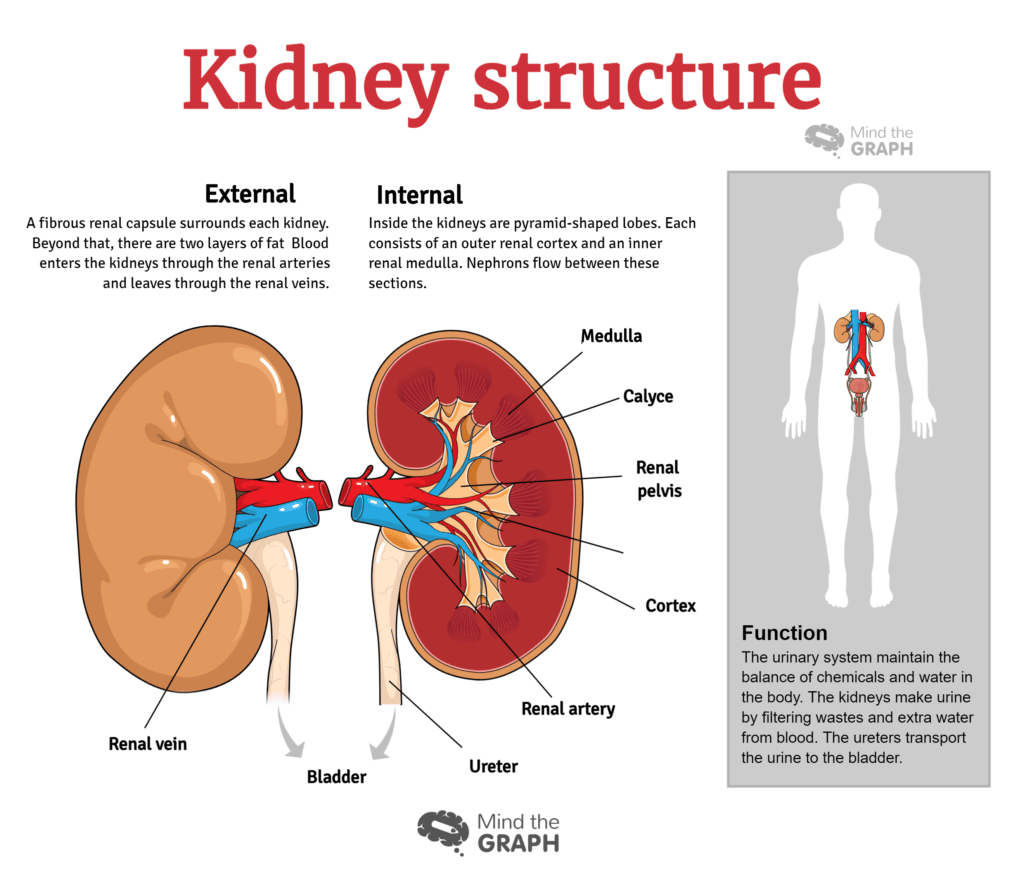Kidney And Urinary System Parts And Their Functions
-
Two kidneys. This pair of purplish-brown organs is located below the ribs toward the middle of the back. Their function is to:
-
Remove waste products and drugs from the body
-
Balance the body’s fluids
-
Release hormones to regulate blood pressure
-
Control production of red blood cells
The kidneys remove urea from the blood through tiny filtering units called nephrons. Each nephron consists of a ball formed of small blood capillaries, called a glomerulus, and a small tube called a renal tubule. Urea, together with water and other waste substances, forms the urine as it passes through the nephrons and down the renal tubules of the kidney.
Two sphincter muscles. These circular muscles help keep urine from leaking by closing tightly like a rubber band around the opening of the bladder.
Nerves in the bladder. The nerves alert a person when it is time to urinate, or empty the bladder.
Urethra. This tube allows urine to pass outside the body. The brain signals the bladder muscles to tighten, which squeezes urine out of the bladder. At the same time, the brain signals the sphincter muscles to relax to let urine exit the bladder through the urethra. When all the signals occur in the correct order, normal urination occurs.
What Are Some Of The Causes Of Chronic Kidney Disease
Chronic kidney disease is defined as having some type of kidney abnormality, or “marker”, such as protein in the urine and having decreased kidney function for three months or longer.
There are many causes of chronic kidney disease. The kidneys may be affected by diseases such as diabetes and high blood pressure. Some kidney conditions are inherited .
Others are congenital that is, individuals may be born with an abnormality that can affect their kidneys. The following are some of the most common types and causes of kidney damage.
Diabetes is a disease in which your body does not make enough insulin or cannot use normal amounts of insulin properly. This results in a high blood sugar level, which can cause problems in many parts of your body. Diabetes is the leading cause of kidney disease.
High blood pressure is another common cause of kidney disease and other complications such as heart attacks and strokes. High blood pressure occurs when the force of blood against your artery walls increases. When high blood pressure is controlled, the risk of complications such as chronic kidney disease is decreased.
Glomerulonephritis is a disease that causes inflammation of the kidney’s tiny filtering units called the glomeruli. Glomerulonephritis may happen suddenly, for example, after a strep throat, and the individual may get well again.However, the disease may develop slowly over several years and it may cause progressive loss of kidney function.
Kidneys Are A Filter System
The main job of the kidneys is to remove waste from the blood and return the cleaned blood back to the body. Each minute about one litre of blood one-fifth of all the blood pumped by the heart enters the kidneys through the renal arteries. After the blood is cleaned, it flows back into the body through the renal veins.
Each kidney contains about one million tiny units called nephrons. Each nephron is made up of a very small filter, called a glomerulus, which is attached to a tubule. As blood passes through the nephron, fluid and waste products are filtered out. Much of the fluid is then returned to the blood, while the waste products are concentrated in any extra fluid as urine .
The urine flows through a tube called the ureter into the bladder. Urine passes from the bladder out of the body through a tube called the urethra. The kidney usually makes one to two litres of urine every day depending on your build, how much you drink, the temperature and the amount of exercise you do.
A healthy kidney can greatly increase its work capacity. With two healthy kidneys, each kidney performs 50 per cent of the normal kidney function. If one kidney is lost, the other kidney can enlarge and provide up to 75 per cent of the normal kidney function .
Also Check: What Is The Va Disability Rating For Kidney Disease
How Much Do My Kidneys Weigh
The weight of your kidneys varies. Variances may include your height, weight, age, body mass index and location.
For men and people assigned male at birth, your right kidney may range from 1/5 to about 1/2 lbs. . Your left kidney may range from a little less than 1/5 to a little more than 1/2 lbs. . Your kidneys may weigh between the weight of one tennis ball and four tennis balls.
For women and people assigned female at birth, your right kidney may range from a little more than 1/10 to 3/5 lbs. . Your left kidney may range from 3/20 to a little less than 3/5 lbs. . Your kidneys may weigh between the weight of one tennis ball or five tennis balls.
What Hormones Do The Kidneys Produce

The kidneys make two main hormones, vitamin D and erythropoietin.
Vitamin D is essential for a number of different functions in the body. Most of the vitamin D that is in the blood is inactive and it is modified by the kidney and other tissues to activate it. Active vitamin D stimulates the uptake of calcium from food, is important for the maintenance of healthy bones and also helps to regulate the response of the immune system to infection.
Erythropoietin is produced when oxygen levels in the blood are low. It acts in bone marrow to stimulate the production of mature red blood cells, to maintain healthy oxygen levels in our tissues.
The kidneys also produce prostaglandins, hormone-like substances, made from lipid . The substances are one way in which the production of renin is stimulated. Renin is an enzyme, also produced by the kidneys, that plays an important role in the reninangiotensinaldosterone hormonal system, which helps to control blood pressure. In addition to making hormones, the kidneys also respond to a number of hormones including vitamin D, aldosterone, prostaglandins, cortisol, parathyroid hormone and calcitonin.
Recommended Reading: What Happens When A Uti Spreads To Your Kidneys
How Do My Kidneys Filter Blood
Each kidney contains more than a million filtering units called nephrons. Each nephron consists of:
- Glomeruli: Glomeruli are groups of tiny blood vessels that perform the first stage of filtering your blood. They then pass filtered substances to the renal tubules. The name for this process is glomerular filtration.
- Renal tubules: These tiny tubes reabsorb and return water, nutrients and minerals your body needs . The tubules remove waste, including excess acid and fluids through a process called diffusion. Your body sends the remaining waste through your kidneys collecting chambers. Eventually, it leaves your body as pee.
Can You Live Without A Kidney
You can live with just one kidney. Healthcare providers may remove one of your kidneys in a radical nephrectomy.
Someone may have only one kidney if they:
- Had a kidney removed due to cancer or injury.
- Made a kidney donation to someone else for a kidney transplant.
- Were born with only one kidney .
- Were born with two kidneys but only one kidney works .
Don’t Miss: Can You Ejaculate A Kidney Stone
What Else Do Kidneys Do
Kidneys are always busy. Besides filtering the blood and balancing fluids every second during the day, the kidneys constantly react to hormones that the brain sends them. Kidneys even make some of their own hormones. For example, the kidneys produce a hormone that tells the body to make red blood cells.
Now you know what the kidneys do and how important they are. Maybe next Valentine’s Day, instead of the same old heart, you can give your parents a special card featuring the kidneys!
Measuring How Your Kidneys Work
It is difficult to calculate the exact rate at which your kidneys work. The best measure of kidney function is called the glomerular filtration rate . The GFR can be estimated using a mathematical formula. This formula uses the level of creatinine in your blood to estimate how well your kidneys are filtering waste from your blood. It can indicate if there is any kidney damage.
The higher the filtration rate, the better the kidneys are working. A GFR of 100 mL/min/1.73 m2 is in the normal range. This is about equal to 100 per cent kidney function. Based on this measurement system, a GFR of 50 mL/min/1.73 m2 could be called 50 per cent kidney function and a GFR of 30 mL/min/1.73 m2 could be called 30 per cent kidney function.
If your doctor orders a blood test to learn more about your kidney function, an eGFR result is provided automatically, along with your creatinine results.
Your doctor may also test for other signs and conditions that may indicate you have chronic kidney disease. These may include tests for:
- protein in your urine
- blood in your urine
- high blood pressure
Recommended Reading: Does Tea Damage Your Kidneys
The Structure And Function Of The Kidneys
Angela Underwood’s extensive local, state, and federal healthcare and environmental news coverage includes 911 first-responder compensation policy to the Ciba-Geigy water contamination case in Toms River, NJ. Her additional health-related coverage includes death and dying, skin care, and autism spectrum disorder.
It is hard to understand the signs and symptoms of kidney disease unless we appreciate the kidneys role in our body. This article explains what the kidneys do and how they accomplish their function.
Your Kidneys & How They Work
On this page:
The kidneys are two bean-shaped organs, each about the size of a fist. They are located just below the rib cage, one on each side of your spine.
Healthy kidneys filter about a half cup of blood every minute, removing wastes and extra water to make urine. The urine flows from the kidneys to the bladder through two thin tubes of muscle called ureters, one on each side of your bladder. Your bladder stores urine. Your kidneys, ureters, and bladder are part of your urinary tract.
You May Like: Is Blueberry Good For Kidney Disease
What The Kidneys Do
Your kidneys are silent workhorses, toiling 24/7 to clean your blood of impurities and toxins that build up from the body’s metabolism. This waste fluid, which we know better as urine, is then excreted. However, the kidneys role extends to well beyond just making urine. They are your bodys very own laboratories that test your blood continuously to make sure every electrolytes concentration is within the specific range that is necessary for your body to function.
As an example, lets consider an electrolyte in your blood, like potassium. Potassium is an electrolyte whose concentration needs to be within a tight range for your heart to generate its normal electric impulses. These impulses cause the heart to beat at a set rhythm or pulse. Both high or low potassium can interfere with this electricity generation and cause your heart to go into an abnormal rhythm. This abnormal rhythm, called arrhythmia, is life-threatening and could cause a person to drop dead in a matter of seconds. However, this does not happen in normal circumstances, because the moment the kidneys detect a rise in the bloods potassium concentration, they dump the extra potassium into urine, thus keeping the potassium level constant in the blood. If it weren’t for your kidneys, a typical meal that you eat could turn out to be a life-endangering experience owing to its potassium content.
Here are some other functions the kidneys serve:
What Are The 7 Functions Of The Kidney

Kidneys are the bean-shaped organs in the body and are the most crucial organ of the body. Everyone knows that the kidneys primary and foremost function is to eliminate waste products from the body by flushing them out through urine. But are you aware of the fact that other than this, there are 6 other essential functions that kidneys perform? Lets get to know this.
You May Like: How To Improve Kidney Function Numbers
What Is Normal Kidney Function
Since many of those living with kidney disease dont experience signs or symptoms until the disease has progressed, understanding normal kidney function is vital to understanding your kidney health.
From the filtering of waste products to the water balance in the body – the kidneys perform many crucial functions. Some of the kidneys key functions include:
Why Are The Kidneys Important
Your kidneys remove wastes and extra fluid from your body. Your kidneys also remove acid that is produced by the cells of your body and maintain a healthy balance of water, salts, and mineralssuch as sodium, calcium, phosphorus, and potassiumin your blood.
Without this balance, nerves, muscles, and other tissues in your body may not work normally.
Your kidneys also make hormones that help
Watch a video about what the kidneys do.
Read Also: Is Barley Good For Kidney Patients
What Could Go Wrong With The Kidneys
When the kidneys are not working correctly, waste products and excess fluid can build up and the levels of sodium, potassium, phosphate and calcium are not regulated correctly. When these substances gather together, this causes the symptoms of kidney disease, which can include high blood pressure, excessive tiredness, fluid retention and possibly lower back pain.
Kidney damage can occur for a number of reasons diabetes, high blood pressure, infections and a group of diseases that affect the glomerulus. The kidneys also need an adequate supply of blood, so if there is something wrong with the blood vessels to the kidney, such as a narrowing, this will prevent the kidneys from working efficiently.
Last reviewed: Apr 2019
The 7 Functions Of The Kidneys
Most people know that the primary function of the kidneys is to eliminate waste products from the body by flushing them out with urine. However, did you know that there are at least 6 other fabulous functions you should thank your kidneys for?
Shaheen Motiwala, MD is one of our nephrologist at Florida Kidney Physicians who loves to educate patients. Here is a brief overview of the 7 primary functions of the kidneys to help patients become more familiar with how these amazing organs work.
Don’t Miss: How To Avoid Kidney Stones
Kidney Disease And Disorders
Kidney diseases and kidney problems are usually treated by a nephrologist. Kidney stones are sometimes treated by a urologist. Here is a list of some of the more common kidney problems:
- Glomerulonephritis inflammation of the glomeruli
- Hydronephrosis excessive fluid within the kidney caused by blocked urine flow
- Pyelonephritis infection of the kidney
- Kidney Stones usually form in the kidneys, but can form anywhere in the urinary tract
- Nephrosis a process that can lead to kidney failure
- Polycystic Kidney Disease a disorder of the kidneys that result in multiple fluid-filled cysts within the kidneys tissues
- Renal Hypertension if the kidneys for some reason do not get enough blood, they set off a series of events leading to high blood pressure
- Renal Infarction similar to a heart attack, but in the kidney, caused by blockage of kidney vessels
- Renal Vein clot clot in the vein that carries blood from the kidney, can be fatal
How Is Chronic Kidney Disease Detected
Early detection and treatment of chronic kidney disease are the keys to keeping kidney disease from progressing to kidney failure. Some simple tests can be done to detect early kidney disease. They are:
It is especially important that people who have an increased risk for chronic kidney disease have these tests. You may have an increased risk for kidney disease if you:
Recommended Reading: Can Protein Powder Cause Kidney Stones
What Should My Gfr Be For My Age
If the glomerular filtration rate is low, it may indicate that the kidneys are not working as they should.
According to the National Kidney Foundation, a normal glomerular filtration rate in adults is above 90, though this ‘normal’ rate may differ based on age.
- 20-29 years: 116
- 60-69 years: 85
It’s important to note that a low GFR may indicate kidney disease but early detection and treatment may help the kidney disease worsening.
How Can I Keep My Kidneys Healthy

Its important to have regular checkups and blood and urine tests to measure your kidneys health. You can reduce your risk of developing a kidney problem by:
- Avoiding or quitting smoking and using tobacco products. Your provider can help you find ways to quit.
- Cutting out excess salt, which can affect the balance of minerals in your blood.
- Increasing daily exercise, which can reduce high blood pressure.
- Limiting your use of NSAIDs. NSAIDs can cause kidney damage if you take them too much.
- Watching your blood sugar levels if you have diabetes.
You May Like: What Do They Do For Kidney Stones
What Percentage Of Kidney Function Is Normal
When it comes to finding out more about your kidneys performance – a blood or urine test is usually the go to. The test commonly tests for eGFR this is a simple calculation to determine how well your kidneys are filtering blood.
The below numbers from the National Institute of Diabetes and Digestive and Kidney Diseases , show whats considered normal and what might be looking further into:
- eGFR of 60 or higher is in the normal range
- eGFR below 60 may mean kidney disease
- eGFR of 15 or lower may mean kidney failure
See also:Can too Much Protein Damage Your Kidneys?